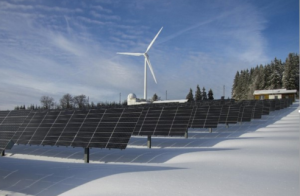 Powering the Future: How Renewable Energy Can Transform Africa
Powering the Future: How Renewable Energy Can Transform Africa
Introduction
Africa is on the cusp of an energy revolution. With abundant natural resources and a growing population, the continent has immense potential to lead in renewable energy adoption. However, over 600 million people still lack access to electricity, and reliance on fossil fuels is causing environmental harm. The continent’s energy sector is dominated by fossil fuels, which not only contribute to climate change but also drain foreign exchange reserves and hinder economic development.
Renewable energy, once considered a niche player in the energy mix, has emerged as a game-changer for Africa’s economic, social, and environmental development. Improving public health, and also creating sustainable jobs—but only if we make the right investments now.
This article explores how Africa can harness renewable energy to transform its future.
The Current Energy Landscape
The Role of Renewable Energy in Africa’s Future
Renewable energy, particularly solar and wind power, offers a clean, sustainable, and abundant alternative to fossil fuels. Africa is endowed with an immense renewable energy potential, with estimates suggesting that the continent could generate over 1,000 GW of solar energy alone.
- Solar Power: Our Game Changer
Africa receives more sunlight than any other continent, making solar energy an untapped goldmine. Countries like Kenya, Egypt, and South Africa are already investing in large-scale solar farms. The Noor Ouarzazate Solar Complex in Morocco is one of the world’s largest solar farms, supplying power to millions of homes. With decentralized solar grids electricity can be brought to rural villages without relying on costly infrastructure. - Wind Energy: Harnessing Natural Resources
Coastal regions and open plains in countries like Ethiopia, South Africa, and Senegal have strong winds that can be converted into electricity. The Lake Turkana Wind Power Project in Kenya is the largest in Africa, producing 310 megawatts of clean energy. Wind farms can supplement other renewable sources to provide stable, year-round energy. - Hydropower & Bioenergy: Localized Solutions
Hydropower: Africa has numerous rivers that can generate clean electricity. The Grand Ethiopian Renaissance Dam is set to become the largest in Africa. We have vast untapped hydropower potential, especially in countries like the Democratic Republic of Congo, Ethiopia, and Zambia. Developing more dams and mini-hydro projects can power rural and urban areas.
Bioenergy: Converting agricultural waste into biomass and biogas/biofuels can provide sustainable energy while reducing waste, particularly for remote villages without grid access.
The Way Forward: Steps to Achieve Energy Sustainability
- Invest in Infrastructure: From the solar-powered homes of Rwanda to the wind farms of South Africa, renewable energy success stories are emerging across Africa. The African Renewable Energy Initiative (AREI) aims to deploy 300 GW of renewable energy capacity by 2030, while the African Union’s Agenda 2063 prioritizes renewable energy as a key driver of sustainable development.
However, despite these successes and opportunities, significant challenges remain. Financing, infrastructure, and policy frameworks are still major hurdles to the widespread adoption of renewable energy in Africa.
Governments and private sectors must fund renewable energy projects and smart grids, offer subsidies and tax breaks to encourage more investments in the energy sector. A great reduction in Africa’s dependence on imported fossil fuels would be seen.
Most importantly reducing the vulnerability of African economies to price volatility.
- Support Energy Education/ Empower Women: Training programs can prepare youth for careers in the green economy. Women should play a critical role in the renewable energy sector, from entrepreneurship and innovation to community engagement and advocacy. However, women’s participation in the energy sector remains limited, with significant barriers to their entry and advancement.
Weesi, as an organization, recognizes the importance of promoting women’s participation in the renewable energy sector. By providing training, mentorship, and networking opportunities. We aim to empower women to become leaders and change-makers in the renewable energy sector.
Conclusion
Africa’s energy future is at a crossroads. As the continent continues to grapple with the challenges of energy poverty, climate change, and sustainable development, renewable energy offers a beacon of hope. Everything Africa needs to lead the global clean energy transition is in our hands—but action needs to be taken. By harnessing the power of Renewable Energy, we can power homes, schools, and businesses drive economic growth, and create a sustainable future for generations to come. All this while protecting our environment. We are far behind in this development as the western continents such as Asia and America
We have nothing to lose. It remains a Win Win for not just us but the world.
Join and Partner with Weesi today.
References
International Energy Agency. (2020). Africa energy outlook 2023. https://www.iea.org/reports/africa-energy-outlook
World Bank. (2022). Tracking SDG7: The energy progress report 2022. https://www.worldbank.org/en/topic/energy/publication/tracking-sdg7-the-energy-progress-report
International Renewable Energy Agency. (2022). Renewable energy market analysis: Africa and its regions. https://www.irena.org/publications.
African Development Bank. (2021). Renewable energy in Africa: An opportunity for climate action and economic growth. https://www.afdb.org/en.
Lake Turkana Wind Power Project. (2022). Official report on renewable energy impact. https://ltwp.co.ke/.
Moroccan Agency for Sustainable Energy. (2023). Noor Ouarzazate solar complex progress report.https://www.masensolar.com.
United Nations Environment Programme. (2023). Africa’s renewable energy revolution: Pathways to a sustainable future. https://www.unep.org/resources.
